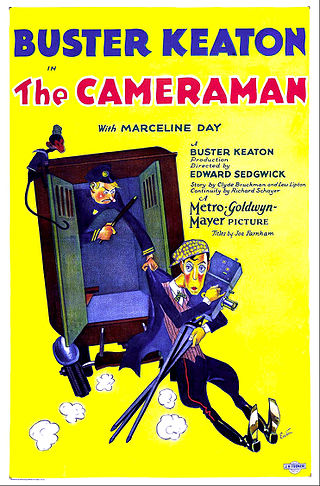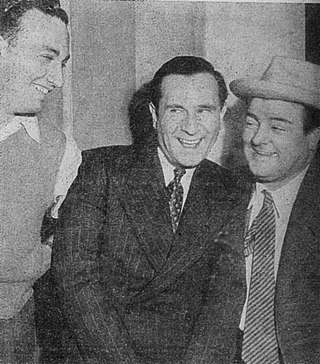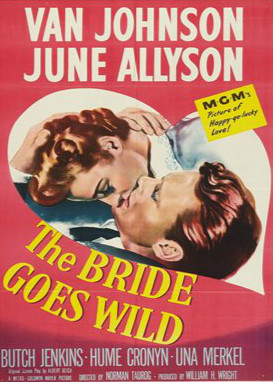
Richard Red Skelton was an American entertainer best known for his national radio and television shows between 1937 and 1971, especially as host of the television program The Red Skelton Show. He has stars on the Hollywood Walk of Fame for his work in radio and television, and also appeared in burlesque, vaudeville, films, nightclubs, and casinos, all while he pursued an entirely separate career as an artist.

Arlene Carol Dahl was an American actress active in films from the late 1940s. She was one of the last surviving stars from the Classical Hollywood cinema era.
That's Entertainment! is a 1974 American compilation film released by Metro-Goldwyn-Mayer to celebrate the studio's 50th anniversary. The success of the retrospective prompted a 1976 sequel, the related 1985 film That's Dancing!, and a third installment in 1994.

Allen Curtis Jenkins was an American character actor and singer who worked on stage, film, and television.

Girl Happy is a 1965 American musical romantic comedy and beach party film starring Elvis Presley in his eighteenth feature. The movie won a fourth place prize Laurel Award in the category Top Musical of 1965. It featured the song "Puppet on a String", which reached #14 on the Billboard Hot 100, #3 on the Adult Contemporary chart and in Canada, and was certified Gold by the RIAA.

Sally Forrest, was an American film, stage and TV actress of the 1940s and 1950s. She studied dance from a young age and shortly out of high school was signed to a contract by Metro-Goldwyn-Mayer.

Three Little Words is a 1950 American musical film biography of the Tin Pan Alley songwriting partnership of Kalmar and Ruby. It stars Fred Astaire as lyricist Bert Kalmar and Red Skelton as composer Harry Ruby, along with Vera-Ellen and Arlene Dahl as their wives, with Debbie Reynolds in a small but notable role as singer Helen Kane and Gloria DeHaven as her own mother, Mrs. Carter DeHaven. The film, released by Metro-Goldwyn-Mayer, was written by Academy-Award-winning screenwriter George Wells, directed by Richard Thorpe and produced by Jack Cummings. Harry Ruby served as a consultant on the project, and he appears in a cameo role as a baseball catcher. The third in a series of MGM biopics about Broadway composers, it was preceded by Till the Clouds Roll By and Words and Music and followed by Deep in My Heart.

I Dood It is a 1943 American musical-comedy film starring Red Skelton and Eleanor Powell, directed by Vincente Minnelli, and released by Metro-Goldwyn-Mayer. The screenplay is by Fred Saidy and Sig Herzig and the film features Richard Ainley, Patricia Dane, Lena Horne, and Hazel Scott. John Hodiak plays a villain in this production, just his third movie role. Jimmy Dorsey and his Orchestra provide musical interludes.

The Cameraman is a 1928 American silent romantic comedy film directed by Edward Sedgwick and an uncredited Buster Keaton. The picture stars Keaton and Marceline Day.

Raymond William Hatton was an American film actor who appeared in almost 500 motion pictures.

S. Sylvan Simon was an American stage/film director and producer. He directed numerous Hollywood films in the late 1930s to 1940s, and was the producer of Born Yesterday (1950).

Spite Marriage is a 1929 American silent comedy film co-directed by Buster Keaton and Edward Sedgwick and starring Keaton and Dorothy Sebastian. It is the second film Keaton made for MGM and his last silent film, although he had wanted it to be a "talkie" or full sound film. While the production has no recorded dialogue, it does feature an accompanying synchronized score and recorded laughter, applause and other sound effects in some scenes. Keaton later wrote gags for some up-and-coming MGM stars like Red Skelton, and from this film recycled many gags, some shot-for-shot, for Skelton's 1943 film I Dood It.
The Fuller Brush Man is a 1948 American comedy film starring Red Skelton as a door-to-door salesman for the Fuller Brush Company who becomes a murder suspect.

The Women is a 1939 American comedy-drama film directed by George Cukor. The film is based on Clare Boothe Luce's 1936 play of the same name, and was adapted for the screen by Anita Loos and Jane Murfin, who had to make the film acceptable for the Production Code for it to be released.

Ambush is a 1950 American Western film directed by Sam Wood and starring Robert Taylor, John Hodiak and Arlene Dahl. The plot is based on the serial story Ambush by Luke Short in The Saturday Evening Post. It is also the first MGM film in the 1950s'.

Texas Carnival is a 1951 American Technicolor musical film directed by Charles Walters and starring Esther Williams, Red Skelton and Howard Keel.

Du Barry Was a Lady is a 1943 American musical comedy film directed by Roy Del Ruth, starring Red Skelton, Lucille Ball, Gene Kelly, and Tommy Dorsey and His Orchestra. It is based on the 1939 stage musical of the same name. Shot in Technicolor, the film was produced and distributed by Metro-Goldwyn-Mayer.

Scene of the Crime is a 1949 film noir directed by Roy Rowland, starring Van Johnson, and featuring Gloria DeHaven, Arlene Dahl, and Tom Drake. The film's screenplay, by Charles Schnee, is based on a non-fiction article by John Bartlow Martin, "Smashing the Bookie Gang Marauders". It was the only property sold by Martin to be made into a film. Scene of the Crime was producer Harry Rapf's last film of his thirty-plus year career; he died of a heart attack a week after principal photography for the film began.

The Bride Goes Wild is a 1948 American romantic comedy film directed by Norman Taurog.
John Francis Donohue was an American film actor, screenwriter, director, producer, composer, and choreographer.
















